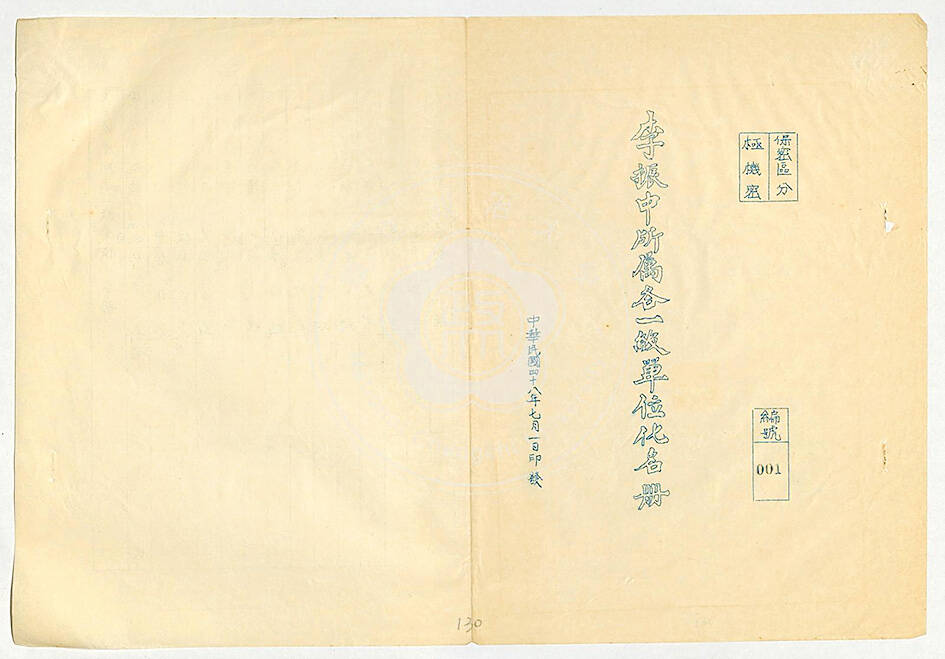The Executive Yuan yesterday approved amendments that would eliminate a requirement to keep political files and national security information permanently confidential.
When political files are categorized as classified national security information, the content should be declassified after 40 years, the amendments state.
The amendments to the Political Archives Act (政治檔案條例) and the Classified National Security Information Protection Act (國家機密保護法) are part of government efforts to pursue transitional justice on behalf of those who were politically persecuted following the 228 Incident in 1947 and during the Martial Law era from 1949 to 1987.

A “top secret” file is pictured in an undated photograph.
Photo courtesy of the Ill-gotten Party Assets Settlement Committee
More than 4,500 political files are permanently classified, National Archives Administration Director-General Lin Chiu-yen (林秋燕) said.
“Once the amendments take effect, starting from Feb. 28 next year, government agencies that possess these permanently classified files would be required to conduct a comprehensive review within six months,” she said. “Should they fail to finish the review within the designated period, the files would be automatically declassified.”
The agency’s preliminary survey showed that about half of the files would be declassified after having remained confidential for four decades, Lin said.
Asked whether investigations into the murders at former Democratic Progressive Party (DPP) legislator Lin I-hsiung’s (林義雄) residence on Feb. 8, 1980, and the Chen Wen-chen (陳文成) Incident in 1981 would be declassified, Lin Chiu-yen said that the National Security Bureau, which possesses these files, would first have to discuss related issues with the National Security Council before the files can be disclosed.
Lin I-hsiung’s mother and twin daughters were killed after he was arrested and put in jail on Dec. 13, 1979, for participating in a human rights rally in Kaohsiung three days earlier.
Chen, an assistant professor of mathematics at Carnegie Mellon University in Pittsburgh, Pennsylvania, was visiting family in Taiwan when he was found dead near a library at National Taiwan University on July 3, 1981.
A day earlier, the 31-year-old had been detained and interrogated by the Taiwan Garrison Command, a state security force that has since been disbanded.
The amendments to the Political Archives Act would also authorize the government to continue and expand the collection of political files, including records and documents on the 228 Incident and the Martial Law era that were produced after Nov. 6, 1992.
Aside from government agencies and state-affiliated organizations, political parties and their affiliated organizations should report and submit political files under their possession, which should be included in the political archives following a review.
If political files contain state secrets and national intelligence sources, a photocopy of the files would be added to the political archives after such information is redacted or removed.
The amendments would also remove a requirement to restrict access to certain political files for 50 years due to potentially serious effects on national security and foreign relations.
Instead, the bill states that access to political files must not be restricted because of regulations in the National Intelligence Service Act (國家情報工作法).
However, if political files contain identities of agents in China, intelligence operations in other countries or other national security information, and declassifying such files would jeopardize the nation’s overseas intelligence operations and put personnel in danger, agencies and organizations can request an extension of up to three years at a time in accordance with the National Intelligence Service Act.
The amendments would also require the government to notify stakeholders of the political files that they can request to have files returned to them.
If the files contain sensitive personal information, stakeholders should be informed that they have priority access, own the right to attach their input and can decide whether they would allow others to access the information.
Political files containing private information of stakeholders can be accessed by third parties only after such information is redacted or removed, unless the files have been classified for 70 years, or stakeholders have agreed to such use or have perished.
The amendments to the Classified National Security Information Protection Act require the confidentiality of national security information sources and state secrets to be confined to 30 years.
Agencies or organizations can request an extension of up to 10 years if confidentiality remains crucial, provided that permission is granted.
Officials must also secure permission to extend the confidentiality period for information that has been classified more than 60 years, based on the amendments.
The amendments would require personnel who have access to confidential information to report to the government after they meet with contacts in China, Hong Kong, Macau and other countries.
Individuals who fail to report would be punished.
Source: Taipei Times - 2023/10/20




















